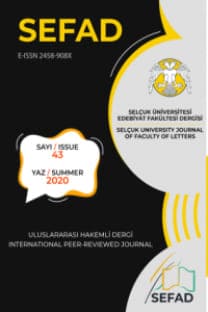Sınırlar Açık: Lawrence Osborne’un Güzel Hayvanlar Romanında Kültürel ve Politik Sınırlar
Lawrence Osborne’un 2017 yılında yayımlanan Güzel Hayvanlar romanı bir Yunan adasında tatil yapan iki genç kadının öyküsünü anlatır. Amerikan vatandaşı Samantha ile Britanya vatandaşı Naomi tatilde arkadaş olurlar ve adada karaya vurmuş halde Faoud adlı Suriyeli bir göçmen bulurlar. Faoud her ikisinin de yaz macerasına dönüşür. Ona adadaki köylerden birinde terkedilmiş bir ev bulurlar ve her gün ona yiyecek ve içecek taşırlar. Ancak, bu macera kötü biter ve genç kadınları yapabileceklerinin kültürel, politik ve psikolojik sınırlarını sorgulamaya iten bir travma içinde bırakır. Bu çalışma genç kadınların Faoud’un varlığı nedeniyle duydukları kaygıya, kültürel ve siyasi sorgulamalarına odaklanmaktadır. Romanı Sartre’ın varoluşçuluğu açısından okuyarak, bu çalışma aynı zamanda bireylerin kendilerni korumak için yapabileceklerinin davranışsal ve psikolojik sınırlarını coğrafi ve siyasi açıdan analiz etmeyi amaçlamaktadır.
Anahtar Kelimeler:
Göç, İltica, Kültür, Politika, Varoluşçuluk, Göçmen krizi
Borders Unbound: Cultural and Political Borders in Lawrence Osborne’s Beautiful Animals
Lawrence Osborne’s Beautiful Animals, published in 2017, is the story of two young women holidaying on a Greek Island. The American citizen Samantha and the British citizen Naomi befriend each other during their summer break when they find Faoud, a Syrian refugee washed on the shores of the island. Faoud turns into their summer project. They find him an abandoned home in a village and cherish him with food and drink every day. However, the project fails and they find themselves in a psychologically traumatic adventure that forces them to question the cultural, political and even psychological borders of what they dare to do. This paper focuses on the anxiety of the young women over Faoud’s existence that prompts crucial cultural and political questions. In analysing the novel from the perspective of Sartre’s existentialism, the paper also questions the cultural, political and geographical borders as well as the behavioural and psychological limits of what one can do for self-protection.
Keywords:
Migration, Asylum, Culture, Politics, Existentialism, Refugee crisis,
___
- Aranson, Ronald. (1989). “Introduction: The Ethics of Truth”. In Jean-Paul Sartre. Truth and Existence. Chicago and London: The University of Chicago Press. pp. vii-xli.
- Berti, Benedetta. (2015). “The Syrian refugee crisis: regional and human security implications”. Strategic Assessment. Vol. 17. No. 4. July. 41-53.
- François Heisbourg. (2015). “The strategic implications of the Syrian refugee crisis.” Survival. 57:6. 7-20. DOI: 10.1080/00396338.2015.1116144
- Huntington, Samuel. (1996). The clash of civilisations and the remaking of world order. New York: Touchstone.
- Kitamura, Katie. (2017). “Affluent idlers find a just cause in a refugee swept ashore.” The New York Times. 05.07.2017. https://www.nytimes.com/2017/07/05/books/revie/beautiful-animals-lawrence-osborne.html . Retrieved on 01.11.2019.
- McCloskey, Molly. (2017). “Beautiful Animals by Lawrence Osborne review – compulsive reading.” The Guardian. 18.08.2017. https://www.theguardian.com/books/2017/aug/18/beautiful-animals-lawrence-osborne-review . Retrieved on 01.11.2019.
- Osborne, Lawrence. (2018). Beautiful Animals. London: Vintage.
- Said, Edward. (2003). Orientalism. London: Penguin.
- Sartre, Jean-Paul. (1989). Truth and existence. Chicago and London: The University of Chicago Press.
- Shriver, Lionel. (2017). “Let’s not mince words Lawrence Osborne’s ‘Beautiful Animals’ is a great book.” The Washington Post. 13.06.2017.
- Waller, Luke. (2017). “Beautiful Animals by Lawrence Osborne – a ‘crazed beast of a novel’.” Financial Times. 11.08.2017. https//www.ft.com/content/eb662c5a-7b63-11e7-ab01-a13271d1ee9c. Retrieved on 01.11.2019.
- Webber, Jonathan. (2009). The Existentialism of Jean-Paul Sartre. New York and London: Routledge.
- Zunes, Stephen. (2017). “Europe’s refugee crisis, terrorism and Islamophobia”. Peace Review: A Journal of Social Justice. 29:1. 1-6. DOI: 10.1080/10402659.2017.1272275.
- Yayın Aralığı: Yılda 2 Sayı
- Başlangıç: 1981
- Yayıncı: Selçuk Üniversitesi Edebiyat Fakültesi
Sayıdaki Diğer Makaleler
Çağdaş Türk Gezgin Yazarlarına Göre Mesafenin Mekânı Dönüştürmesi
Abdurrahman Munîf’in “Sibâku’l-Mesâfâti’t-Tavîle” Adlı Romanında Doğu Kültüründen İzler
Rıfat IŞIK, Mehmet Beşir BULUT
George Chapman’ın Ceasar and Pompey Trajedisi ve Arabulucu Cato
Mecmûa-i İlâhiyât'ın MESTAP'a Göre Muhteva Tablosu
Jane Austen‘ın Mansfield Parkı’nda Sınıf Engellerine Meydan Okuma
Hellen ve Roma Dünyasında Patronus-Cliens İlişkisi
Azerbaycan Türkçesinin Bir Diyalektiyle Yazılmış Luka İncili Üzerine
